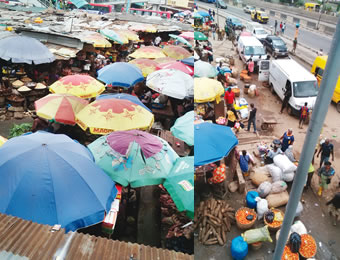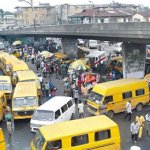Officials of Kick Against Indiscipline (KAI), Wednesday afternoon, sat in their green van, a few metres away from the pedestrian bridge at Mile 12, Lagos. It is unlawful for pedestrians to cross the road and the officials were there to ensure that they all used the bridge. But it seemed a needless watch: the bridge is new and user-friendly and everyone appeared only pleased to use it. Indeed, a first-time user (who is not in a hurry) might be tempted to linger on and take several minutes to admire its green roof and silver railings.
It is a busy market-one of the busiest in Lagos. Truckloads of goods (mostly foodstuffs) throng the market on a daily basis. But it is not only for food that this market is known; it is believed to be preponderantly populated by Hausa traders.
“It is because of the kinds of things they sell here”, Mr Olanrewaju Onigemo, General Secretary of the Association of Market Women and Men of Nigeria, Mile 12, told Saturday Tribune on Wednesday. “You know perishable items… items like tomatoes, onions. They are brought from the North. Definitely, some of them would follow the goods from the North down to this market. And then when they come here, they have to help in offloading the trucks. Later, some of them would be here to take care of the goods offloaded until they are sold to the wholesalers. Eventually, some of them would get used to the place and they may decide to settle down here.”
Discrimination: Onigemo, who also serves as the General Secretary of the association
at the local government level (Ikosi-Isheri), sat in the association’s office at Mile 12, a one-storey building overlooking the main road. “Mile 12 is an international market”, he said proudly, adding, “People come here from all over the country and beyond to buy foodstuffs and other things. Some of the goods are brought in from our neighbouring countries. The market is actually more than fifty years old.”
Onigemo said it was impossible for any tribe to discriminate against others because “the soul of the business cannot permit it.” He seemed offended, though, when asked if it was possible that a dominant ethnic group could influence the politics and philosophy of the market.
“This is Yoruba-land. Even though other tribes come in here to do business, they can never dominate the tribe that owns the land. Whatever line of business the Hausa people are into, you will still find Yoruba people there; you will still find Igbo people there. I can only say that we have many of them in the market, not that they have dominated the tribe that owns the land. I know Nigeria is owned by everybody. But we have pioneers in every part”, he said.
According to Onigemo, even though the lines are clearly marked, they are not nonetheless rigid: “Where they sell electronics, we have Igbo people there more than other tribes. That doesn’t mean other tribes are not there. Where they sell yam flour, you have more Yoruba there because it is used for making Yoruba food. Again, when you talk of wholesale, you find Hausa and Igbo. But when you talk about retail, you find Yoruba.
“Another market that has a high number of Hausa people is Alabarago, along Badagry Road. Hausa people used to be Number One there, but I think Igbo people have overtaken them now. But we also have Yoruba people there. The tribe that owns that place is Awori.”
Great gulf
Another market that has come to be associated with a particular ethnic group is Alaba International Market at Ojo. Saturday Tribune found out, however, that there are indeed a number of sections at the market dominated by other ethnic groups.
Ifelodun Section (where items such as keys, padlocks, nails and some building materials are sold) is known to be “controlled” by Yoruba traders. Bureau de Change agents as well as traders of mattresses, curtain and some other home wares who dominate a particular extension of the market are almost exclusively Hausa.
“I think it is really about what the different tribes are known for”, said Pastor Eze Emmanuel, Chairman of Unity Estate at Alaba, who added that, “Take Hausa people for instance, no matter the situation, they have the means to source the dollar.
“That said, I must let you know that we really all have our boundaries. It is like Nigeria and the various states that make it up. We even have gates for each section. At the close of work, every section closes its gate. It is possible that a particular section may be having a problem and the other sections will not be affected. In fact, if that kind of situation occurs in the day, other sections will close their gates so that people from the troubled zones don’t enter. It is just like heaven and hell. We are told in the Bible that a rich man and a poor man died and the poor man went to heaven, while the rich man went to hell. The rich man asked the poor man whom he used to maltreat while he was on earth to dip his hand in water and send him a drop; the poor man told him that there is a great gulf fixed between them.
“That’s the kind of gulf we have here. We can see each other, but we know our boundaries. Each section has its own leadership, executive, etc, even though we have what we call Alaba Amalgamated which is the umbrella body that comprises all the sections. But even those sections where you have Igbo, Hausa, or Yoruba dominating, there are always members of other tribes there. You are free to obtain a shop at any section in the market.”
About money
Chukwuma Okorie sat beside his electronics shop at Alaba chatting loudly with his neighbour. Asked why there are too many Igbo people at Alaba, he answered: “It’s because shops at Alaba are very expensive. Only Igbo people can afford them” and laughed. He must have intended that to be a joke, though.
WATCH TOP VIDEOS FROM NIGERIAN TRIBUNE TV
- Relationship Hangout: Public vs Private Proposals – Which Truly Wins in Love?
- “No” Is a Complete Sentence: Why You Should Stop Feeling Guilty
- Relationship Hangout: Friendship Talk 2025 – How to Be a Good Friend & Big Questions on Friendship
- Police Overpower Armed Robbers in Ibadan After Fierce Struggle






